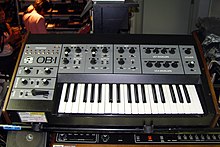Oberheim OB-1
| OB-1 | |
|---|---|

Oberheim OB-1
|
|
| Manufacturer | Oberheim |
| Dates | 1978 |
| Technical specifications | |
| Polyphony | 1 voice |
| Timbrality | Monotimbral |
| Oscillator | 2 VCOs |
| LFO | 1 |
| Synthesis type | Analog Subtractive |
| Filter | 2 or 4 pole switchable VCF |
| Attenuator | 2 x ADSR; one for VCF, one for VCA |
| Aftertouch expression | No |
| Velocity expression | No |
| Storage memory | 8 patches |
| Effects | None |
| Input/output | |
| Keyboard | 37-key |
The Oberheim OB-1 was a monophonic, programmable, analog synthesizer introduced by Oberheim Electronics in 1978. It originally sold for $1,895 and was the first analog synthesizer capable of storing patches.The design was based on the Oberheim SEM (Synthesizer Expansion Module) and intended to be used for live performance.
The OB-1 was essentially an all-in-one, pre-routed Oberheim SEM and had one voice of polyphony, with two VCOs and a switchable multimode filter. It also contained an envelope control for both the filter and amplitude.
Notable users of the OB-1 were the composer and musician Vince Clarke and the bands Tangerine Dream, Rush, and The Grid. A 2014 feature on the French radio station France Inter claimed that the OB-1 had been used by the Star Wars sound engineer Ben Burtt to create the voice of R2-D2 and that the name of another Star Wars character, Obi-Wan Kenobi, derives from a transliteration of "OB-1". However, Star Wars was first released in 1977, a year before the OB-1, and most sources credit the ARP 2600 synthesizer as being used to record R2-D2's voice.
...
Wikipedia
